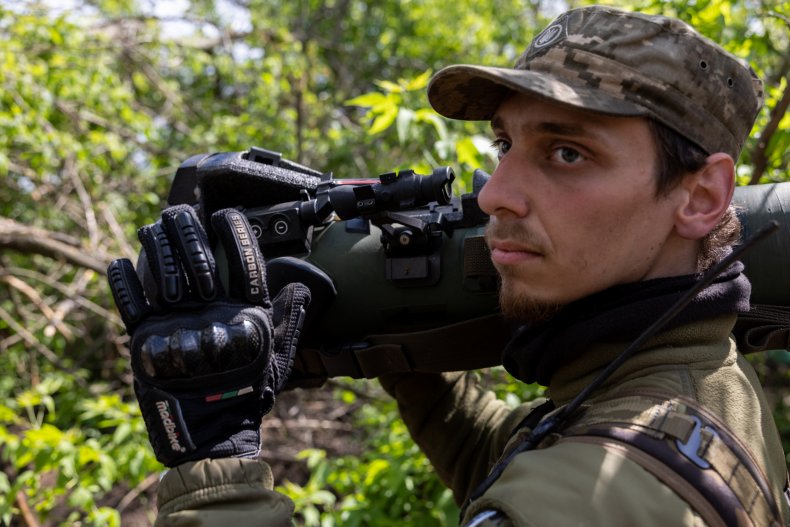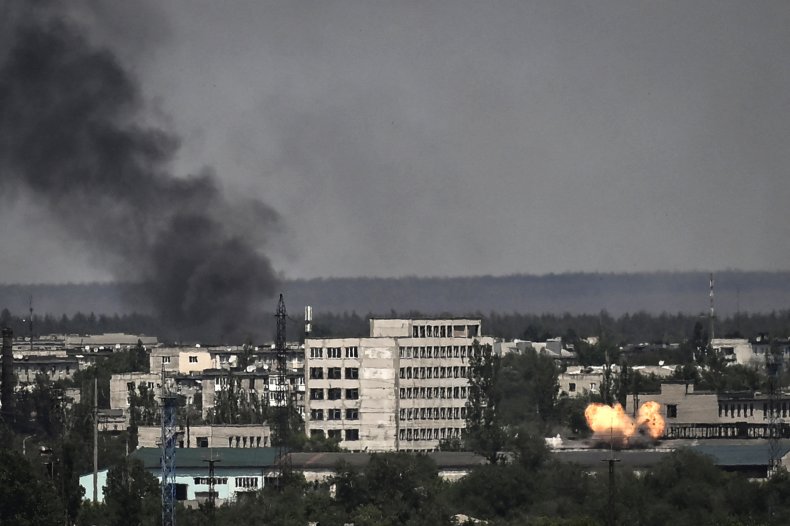Ukraine Troops Retreating in Donbas Have a Plan, Luhansk Governor Says
Serhiy Haidai, the governor of the war-torn Luhansk Oblast in eastern Ukraine, has told Newsweek that any troops withdrawing from the front line city of Severodonetsk in the face of the Russian advance have a fallback plan, and will continue the fight against invading troops.
Speaking with Newsweek by phone from Luhansk on Tuesday, Haidai—a Severodonetsk native who has been leading the evacuation of the region and working with Ukraine’s military command—said Russian troops had captured a “significant part” of the city, one of only two significant settlements in Luhansk Oblast not yet under Moscow’s control.
“The fighting has indeed intensified significantly in recent days because the Russian army threw a lot of forces and equipment in order to capture the entire Luhansk region,” Haidai explained.
“This task is a priority for them, because this is not a particularly large territory and could become low-hanging fruit for the Russian high command that wants to show some victories.”
Victory in Severodonetsk would hand Russia almost full control of the Luhansk Oblast; one of Ukraine’s two most easternmost provinces and a key war goal for the Kremlin.

John Moore/Getty Images
Taking Luhansk and neighboring Donetsk Oblast would allow President Vladimir Putin to claim victory in the Donbas, which has been split between Ukrainian and Moscow-backed separatist forces since 2014. The region is central to the Kremlin’s false narrative of its supposed “de-Nazification” of Ukraine and the “liberation” of the Russian-speaking population there.
Haidai said remaining defenders in Severodonetsk are prepared to retreat across the Siverskyi Donets river to the city Lysychansk, which—if the former falls—will be the last Ukrainian-controlled city in Luhansk Oblast.
“I’m constantly in touch with the military command, discussing what are the options for a strategic withdrawal,” the governor explained.
“The neighboring city, Lysychansk, where we could and might need to retreat if push comes to shove, is not far and is on higher ground [than Severodonetsk], so it is strategically much more important. But for Russia, Severodonetsk is a key target because it is a regional center.
“The fighting will continue, our military will not be surrounded, the supply of ammunition will continue, and they will be able to hold their positions and attack the Russian forces from above.
“In terms of positional advantage, their situation will be better than defending from Severodonetsk.”
Ukrainian defenders have maintained access to the city from the west despite the intense Russian assault, Haidai said.
“I do not think that there will be a repetition of Mariupol here,” Haidai said, referring to the port city to the south which was besieged and destroyed by Russian forces.
Mariupol has become synonymous with the death and devastation wrought by Russia’s invasion. Local officials say civilian casualties in the razed city could be as high as 22,000.
They have, however, noted this figure is impossible to confirm given the scale of the devastation and alleged Russian efforts to cover up atrocities including summary executions, torture, rape, and forced relocation—all of which Moscow denies.
“Firstly, Severodonetsk is not surrounded, the troops can strategically retreat,” Haidai said. “Secondly, since part of the city is already occupied by the Russians, it makes no sense for them to shell it with artillery.”
Shortly after Newsweek spoke with Haidai, the governor announced on Telegram that Russian shelling had detonated a nitric acid tank at a chemical plant, releasing dangerous chemicals into the surrounding area.
President Volodymyr Zelensky said on Tuesday that the Russian shelling of Severodonetsk was “madness,” given the number of chemical plants in the city. The attacks, he said, included “blind” aerial bombardment.

ARIS MESSINIS/AFP via Getty Images
Haidai said only 15,000 of the pre-invasion 120,000 residents of Severodonetsk are still in the city. “And these are mostly people who just want to stay, so it makes no sense for Russia to deport them,” he said.
Evacuation efforts have, however, been paused indefinitely due to Russian shelling. “Yesterday, I stopped the evacuation after our armored car, which was sent to pick up civilians, was shelled by heavy Russian artillery,” Haidai explained.
“Inside there were patrol officers who dealt with the logistics of civilian evacuation; this car was never used for military purposes.
“There was also a group of journalists from France inside, and unfortunately one fragment broke through the windshield and hit the journalist in the neck. Sadly, he died. Therefore, I paused the evacuation indefinitely, but thankfully we have already evacuated most of the civilian population.”
Russian troops appear poised to cement control over Severodonetsk in the coming days. It remains to be seen if Russian units have the momentum to cross the river and seize Lysychansk, too, thus completing the conquest of Luhansk.
“I feel sorry for every village and every settlement in the Luhansk region that falls under the control of the invaders, and would be distraught if Severodonetsk, the city where I was born, fell in their hands,” Haidai said.
“But from a basic military perspective, the city is not of great strategic importance, since neighboring Lysychansk, as I said, is on a hill, unlike Severodonetsk, so that location will give the military a massive advantage.”
Newsweek has contacted the Russian Foreign Ministry to request comment.

Comments are closed.